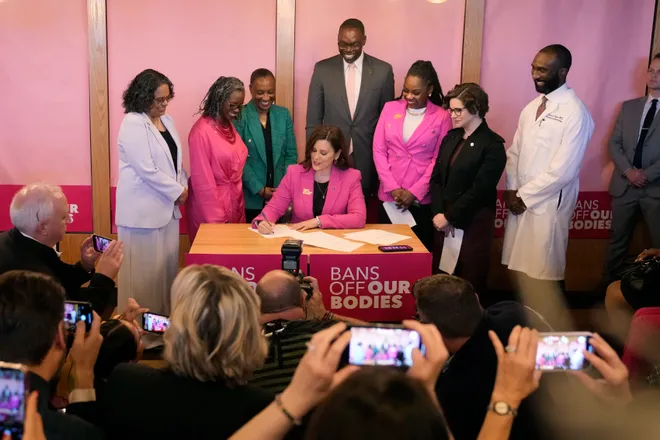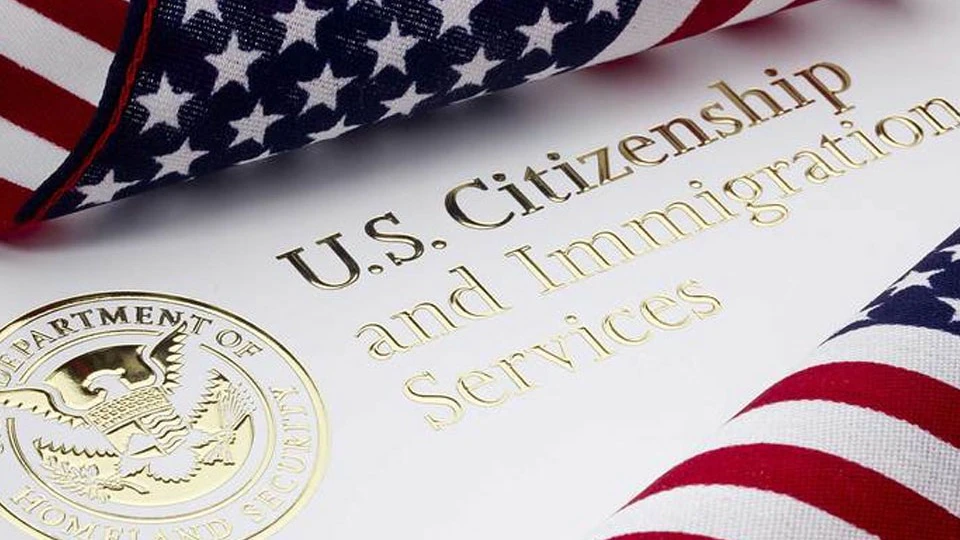World
Michigan governor, Gretchen Whitmer, revokes 1931 law banning abortion in the state

Gretchen Whitmer, governor of Michigan, United States, has signed a repeal of the state’s 1931 abortion ban.
The near-century-old abortion ban made it a four-year felony to assist in an abortion. The ban also prohibited the procedure even in cases of rape and incest, except to preserve the woman’s life.
Roe v. Wade, the historic 1973 ruling that affirmed the constitutional right to abortion in the US, had made the law void until the landmark decision was overturned in June 2022 by the country’s supreme court.
In November 2022, the proposal to lift the ban received a record-breaking number of votes from residents in the state.
Signing the revocation of the law on Wednesday, Gretchen said the decision was “long overdue”.
She described the 1931 ban as a “zombie” that predates the Roe v. Wade ruling and was back to haunt women.
“Today we’re going to take action to make sure that our statutes, our laws reflect our values and our constitution. I’m excited today to be signing the bill that will repeal our extreme 1931 law that bans abortions and criminalises nurses and doctors for just doing their jobs,” Gretchen said.
“This is a long overdue step and it proves that when we keep fighting to protect everyone’s ability to make their own decisions over to make over their bodies, we can win.
“To all the women and girls and allies in states that don’t value you or your rights, maybe you should come to Michigan.”
Following the 2022 US supreme court verdict, most abortions are now banned in 13 states while the fight over abortion access is still taking place in courtrooms in other states.
World
Trump dismisses claims of handing presidency to Musk as ‘hoax’

Could Elon Musk, who holds major sway in the incoming Trump administration, one day become president? On Sunday, Donald Trump answered with a resounding no, pointing to US rules about being born in the country.
“He’s not gonna be president, that I can tell you,” Trump told a Republican conference in Phoenix, Arizona.
“You know why he can’t be? He wasn’t born in this country,” Trump said of the Tesla and SpaceX boss, who was born in South Africa.
The US Constitution requires that a president be a natural-born US citizen.
Trump was responding to criticism, particularly from the Democratic camp, portraying the tech billionaire and world’s richest person as “President Musk” for the outsized role he is playing in the incoming administration.
As per ceding the presidency to Musk, Trump also assured the crowd: “No, no that’s not happening.”
The influence of Musk, who will serve as Trump’s “efficiency czar,” has become a focus point for Democratic attacks, with questions raised over how an unelected citizen can wield so much power.
And there is even growing anger among Republicans after Musk trashed a government funding proposal this week in a blizzard of posts — many of them wildly inaccurate — to his more than 200 million followers on his social media platform X.
Alongside Trump, Musk ultimately helped pressure Republicans to renege on a funding bill they had painstakingly agreed upon with Democrats, pushing the United States to the brink of budgetary paralysis that would have resulted in a government shutdown just days before Christmas.
Congress ultimately reached an agreement overnight Friday to Saturday, avoiding massive halts to government services.
World
Seven confirmed dead in Western Mexico plane crash

At least seven people died when a light aircraft crashed Sunday in a heavily forested area of Jalisco in western Mexico, local authorities reported.
The aircraft, a Cessna 207, was flying from La Parota in the neighbouring state of Michoacan.
Jalisco Civil Protection said via its social media that the crash site was in an area that was difficult to access.
Initial authorities on the scene “reported a preliminary count of seven people dead,” who haven’t been identified yet, according to the agency.
“A fire was extinguished and risk mitigation was carried out to prevent possible additional damage,” it added.
Authorities said they were awaiting the arrival of forensic investigators to remove the bodies and rule out the presence of additional victims.
World
12 Pathways to U.S. citizenship available in 2025

There are twelve main pathways for individuals to apply for U.S. citizenship, each with specific criteria and procedures.
These options include family-based immigration, employment opportunities, and asylum, providing various routes for those seeking U.S. citizenship.
According to the DAAD Scholarship, prospective applicants can pursue different immigration routes, depending on their situation.
From marriage to a U.S. citizen to qualifying for the Diversity Visa Lottery, each pathway leads to permanent residency and, eventually, citizenship.
Below is a breakdown of the twelve most common ways to gain U.S. citizenship.
1. Military Service Pathway
Non-citizens who serve in the U.S. military can apply for naturalization during active duty or after one year of service.
Apply here: Naturalization through Military Service
2. Family-Based Immigration (Immediate Relatives)
Immediate relatives of U.S. citizens—spouses, parents, and unmarried children under 21—do not face annual visa caps. After receiving a Green Card, they can apply for citizenship after 3 to 5 years.
Apply here: Green Card for Immediate Relatives
3. Marriage to a U.S. Citizen
Marrying a U.S. citizen allows immigrants to apply for a Green Card through a spousal visa. After three years of marriage as a permanent resident, they may apply for naturalization.
Apply here: Spousal Visa Information
4. Diversity Visa (DV) Lottery
The Diversity Visa Lottery offers a random selection process for applicants from countries with low immigration rates to the U.S. If selected, individuals receive a Green Card and can apply for citizenship after five years.
Apply here: DV Lottery Application
5. Employment-Based Immigration (EB-1, EB-2, EB-3)
Highly skilled workers or professionals in high-demand fields may obtain a Green Card through employment-based visas, including EB-1 and EB-3 categories. After five years, applicants can apply for U.S. citizenship.
Apply here: Employment-Based Green Card
6. Refugee or Asylum Seeker Pathway
Individuals fleeing persecution can apply for refugee or asylum status and later adjust their status to permanent resident. After five years, they may apply for citizenship.
- Apply here: Asylum Application
- Apply here: Refugee Information
7. Family-Based Immigration (Preference Categories)
Siblings and married children of U.S. citizens can apply for Green Cards, though the process may take several years due to long waiting times. Once approved, applicants can apply for citizenship after five years.
Apply here: Family Preference Green Card
8. Study-to-Citizenship Pathway
International students who graduate from U.S. universities on F-1 visas can transition to work visas like H-1B, secure employer sponsorship, and eventually apply for citizenship after five years.
Apply here: Steps to Naturalization
9. Special Immigrant Visas and Humanitarian Pathways
Special immigrant visas are available for those who have worked with U.S. forces abroad or victims of trafficking. After receiving a Green Card, they may apply for citizenship.
Apply here: Special Immigrant Visa
10. EB-5 Investor Visa
Through the EB-5 program, individuals who invest $900,000 to $1.8 million in a U.S. business may obtain a Green Card. Citizenship can be pursued after five years.
Apply here: EB-5 Immigrant Investor Program
11. Adoption Pathway
Children under 18 who are adopted by U.S. citizens automatically gain citizenship upon entering the U.S. as permanent residents.
Apply here: Adoption Process
12. Special Legal Provisions
Some individuals may qualify for citizenship under special provisions, such as the U visa for victims of crime or the registry for those who have lived in the U.S. since 1972.
Common requirements for U.S. citizenship
Regardless of the pathway, applicants must be at least 18 years old, have continuous residence for 3 to 5 years as a Green Card holder, and be physically present in the U.S. for 18 to 30 months, depending on their specific situation.
Additionally, applicants must demonstrate good moral character, pass an English and civics test, and take the Oath of Allegiance.
The road to U.S. citizenship in 2025 involves multiple options, each with its own challenges. Understanding the requirements of each pathway is essential for anyone seeking permanent residency or citizenship in the United States.
-

 News1 week ago
News1 week agoNaseni’s Executive Vice Chairman, Khalil Suleiman Halilu, Named 2024 Winner Of Daily Global Newspaper Conference Series Award For Science, Technology, Innovation, And Infrastructure
-

 Relationships1 week ago
Relationships1 week agoFour dating tips for single mum
-

 Relationships5 days ago
Relationships5 days ago‘I wish I met you before the wrong person’ – says Portable’s baby mama, Honey Berry, as she flaunts new lover
-

 Politics1 week ago
Politics1 week agoIbrahim Kashim resigns as Bauchi SSG
-

 Entertainment1 week ago
Entertainment1 week agoApostle Femi Lazarus, others top Spotify most streamed podcasts in Nigeria, Kenya, South Africa
-

 Business4 days ago
Business4 days agoPoS operators increase withdrawal charges, blame electronic levy, cash scarcity
-

 News6 days ago
News6 days agoLagos state government shuts Lord’s Chosen Church, businesses across Lekki, VI, others over noise, environmental infractions
-

 Politics1 week ago
Politics1 week agoRep seeks increased participation of women in politics


















